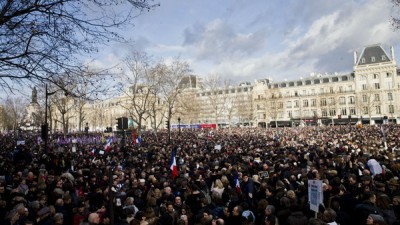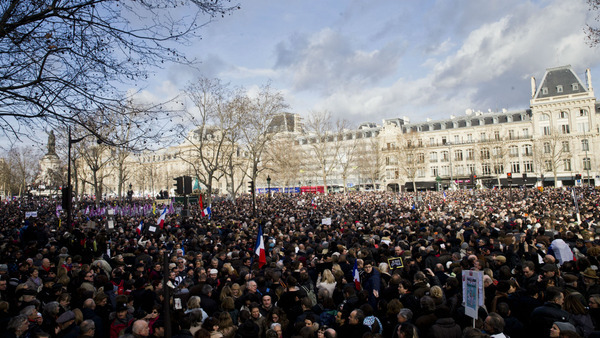
As I write this Friday night, several things are true. A prolonged manhunt continues in France, pursuing suspects involved with an attack on a kosher supermarket. The Grand Synagogue of Paris is closed on Shabbat for the first time since World War II, a harrowing start to 2015 following a year of resurgent, ugly anti-Semitism. French Muslims are “seized by fear,” as mosques have been violently attacked, shot at, defaced with swastikas, Nazi slogans, and pig heads. Arabes dehors, read one such inscription: Arabs, get out. Meanwhile, the omnipresent voices of war and hate crescendo in America, some demanding that Muslims embrace the legitimacy of racist vitriol, others calling for an entire people to be “held responsible” and made even more unwelcome in Europe over the actions of a few.
Shabbat Shalom does not come easily tonight. Though our situation in America is undoubtedly preferable to that of our coreligionists and Abrahamic family in France, I find myself struggling to welcome Shabbat on a night that feels so devoid of Shalom. Shalom communicates a wholeness, a harmony; tonight the world is shattered and discordant. If in L’cha Dodi we urge Shabbat to come in peace, it is hard to imagine the bride coming at all this week.
And yet our tradition has long rejected the notion that God cannot be praised when the world is dark. Mishnah Berakhot teaches that one says a blessing over good and evil alike. On hearing bad news, especially of a death, one says Baruch atah Adonai, Eloheinu melech ha-olam, dayan ha-emet: Blessed is the true judge. I confess that I am perplexed by this tradition. It seems almost insensitive to even insinuate that the death of innocents might be God’s judgment. But perhaps there is a deeper meaning: If God is dayan ha-emet, then the anti-Semites and Islamaphobes, the terrorists and the war-mongers are false judges, no matter how emphatic their claim to divine sanction may be. We mourn the victims by praising God’s name in the Kaddish; Rabbi Akiva is said to have taught that this aids the safe passage of their souls from Gehenna. Perhaps this is true; the Kaddish brings peace to the dead precisely by refusing to give up affirmation of dayan ha-emet even when idolatrous acts announce themselves so loudly that they threaten to drown out our daily Pslams. At a moment of disputation over who judges whom and how, we sing praise to the Lord in order to stake our claim with the One who makes peace in the high heavens, and, God-willing, on Earth in our days.
I turned to our Torah, hoping to find “a tree of life…[whose] paths are peace.” As it happens, this week’s parsha is one of my favorites: Shemot, the parsha I read when I became a Bar Mitzvah eight years ago. Shemot contains many lessons for our present moment. With many seeking irresponsibly to frame the situation as a clash of cultures, what could be more powerful than the story of a child born to Hebrew slaves, raised by Egyptian royalty, who marries a Midianite woman? Moses was a refugee, viewed suspiciously by his ancestral community and threatened with punishment by his adopted people. Indeed, it is the Midianite priest, a non-Israelite, and an idolator according to Jewish law, who is the hero of Shemot. He is an outsider who welcomes another outsider, showing us that differences do not make the stranger any less human, and should not prevent us from entering into communal fellowship with them. In the days since the Charlie Hebdo attack, many have sought to stigmatize the strangers among us; but let us not forget that the founder of our people, himself an ambivalent mix of Hebrew and Egyptian (Ex. 2:19), was a foreigner welcomed without a second thought, never demeaned or persecuted for his nationality, religion, or immigration status.
Does this offer us a basis for hope in God’s promise of shalom? I am not sure. But perhaps a clue is found at the end of the parsha. Moses protests to God, demanding to know why the promised redemption has yet to occur. God simply reiterates the promise of redemption without addressing Moses’ concerns, and the parsha ends. Shemot teaches us that God is shomea tefilah, One who hears prayers, but here it is not apparent that the protest actually was heard. Between Moses’ petition and the uncertainty of it being heard, the moment is tense. The Israelites do not know how or if God will fulfill God’s promises, and they are left somewhat in suspense. At the same time, their situation demands that they anticipate God’s liberating intervention, and thus they cannot refuse hope in spite of the frustration it brings.
Perhaps that moment is mirrored in our own. Idolatry has overrun God’s creation, in the form of militarized empire and precious life rendered precarious, and we do not know when or if deliverance is coming. A Rabbinic legend, or Midrash, teaches that if Israel observed just one Shabbat perfectly, the Messiah would immediately come; perhaps in our time, we might say that if the drones would land, if the jails would empty, if the occupations would end, for just one Shabbat, then Mashiach would come. Perhaps the temporal gap between God’s promise and its anticipated fulfillment is a site of frustrated hope, in which all we can do is stand together with our sisters and brothers who know well what it is to be foreigners, and ask why God is taking so long. We do this not as a way of ignoring the brokenness in God’s creation, but precisely to ignite a passion for mending it.
There are those who argue the last word belongs to the fear and violence that attempt to make this brokenness seem insurmountable. To them I respond, Baruch dayan ha-emet. May the True Judge’s reign come in our lifetime and in our days; Shabbat Shalom.
Evan Goldstein is a student at Boston College.

